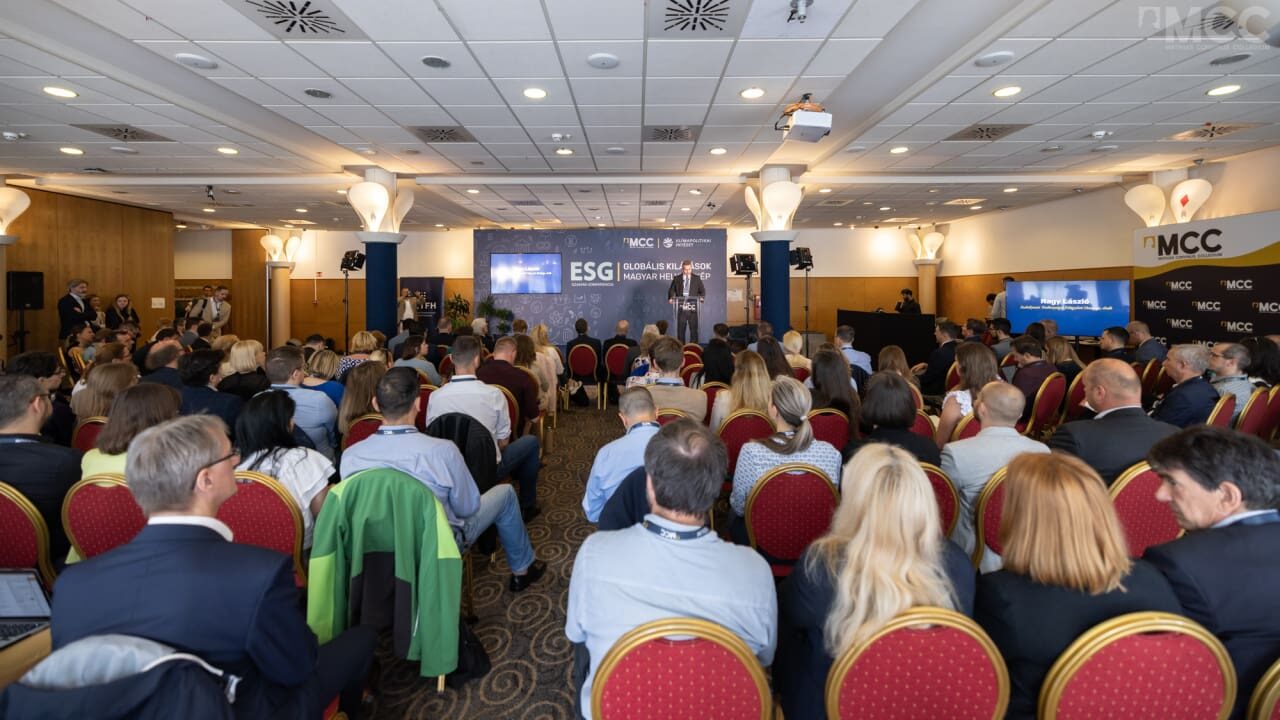A professional conference organized by the Mathias Corvinus Collegium’s Climate Policy Institute brought together representatives from government authorities, the financial sector, corporate interest groups, consultants, academia, and businesses to discuss and share insights on ESG, ahead of Hungary’s EU presidency on 4 June.
ESG (Environmental, Social, and Governance) considerations are gaining global importance, not only in Western countries but also in developed regions in the East. The European Union has already instituted several ESG regulations, with more expected soon. It is clear that in the upcoming years, most businesses will be impacted by ESG requirements in various ways. ISO standards, energy efficiency, workplace safety, fire safety, corporate social responsibility (CSR), equal opportunities, and employment policies are some aspects likely to be incorporated under the ESG umbrella in the future. Despite this, many societal and economic stakeholders remain largely unaware of these impending changes.
The event began with the MCC Director General Zoltán Szalai welcoming the audience and guests. He underscored that ESG is becoming more and more important every day, and thanked the esteemed experts who accepted MCC’s invitation to discuss the topic.
After the welcoming speech, a presentation followed about the Regulatory Authority for Supervised Activities (SZTFH) founded in 2021 to address potential dangers and crises through state intervention, creating a stable and predictable regulatory environment for nationally significant sectors such as gambling, tobacco trade, mining, geological activities, cybersecurity, and ESG. László Nagy, the newly appointed president of SZTFH, highlighted that the emergence of sustainability attitudes is significantly impacted by the ESG framework. This economic umbrella term allows for the evaluation of individual economic organizations based on sustainability criteria in a comparable and objective manner. Determining effective tools for economic intervention is crucial, and understanding the various needs is essential for this purpose, he stressed.
During the first panel discussion, Radován Jelasity, president of the Hungarian Banking Association, noted that the environmental component (‘E’) of ESG often overshadows the social (‘S’) and governance (‘G’) aspects, which also deserve more attention. The banking sector has demonstrated its social responsibility through family support programmes, such as the baby-awaiting loan. The popularity of ESG is driven by social demand; a 2023 global survey indicated that 64 per cent of consumers consider environmental sustainability very or extremely important, with this figure being 61 per cent among European consumers. In Hungary, a survey conducted by the Hungarian National Bank (MNB) between 2019 and 2021 found that 95 per cent of respondents value environmental protection. András Gelencsér, rector of the University of Pannonia, emphasized that technological development alone is insufficient; societal involvement is essential for solving environmental issues. He also stressed the global significance of ESG, noting that local implementation alone would be ineffective.
On the second panel, Péter Bera, head of department at the Ministry of Energy, highlighted that ESG regulations should impose minimal additional burdens on businesses. It is critical to define what constitutes transparent and sensitive information and handle it appropriately for security purposes. Márton Bókay, deputy state secretary at the Ministry of National Economy, stated that ESG regulation should be approached pragmatically, addressing real issues. Establishing ESG regulations could provide Hungary with a competitive advantage, he added. András Hajdú underscored the importance of a national framework for ESG regulation, focusing on directions beneficial to Hungary. Olivér Hortay, Head of Energy and Climate Policy Division at Századvég, raised concerns about the measurability of ESG components and the separation of the three pillars, suggesting that ideologically driven measures lack social legitimacy.
After a short break in the itinerary, Gábor Csaba Molnár, ESG director at SZTFH, explained that the aim of the ESG law (Act CVIII of 2023) is to enhance the competitiveness of Hungarian companies. ESG encompasses three pillars, Environmental, Social, and Governance, for which companies must provide data via a questionnaire. Currently, ESG ratings can be issued by anyone based on any data, as there is no regulation in this area. The ESG law aims to register raters, verify their methodologies, and facilitate stakeholder communication. The ESG questionnaire seeks to balance all three pillars while reducing corporate administrative burdens. The questionnaires must also be tailored to area and company size. SZTFH maintains a register of companies obligated to provide ESG data, certifiers, consultants, raters, and companies producing and marketing ESG software to ensure transparency.
During the third panel discussion Gergő Wieder, director of KPMG, pointed out that ESG ratings often depend on the weighting of ESG factors, which can complicate assessments. For example, a company producing sustainable products may have a poor social perception. Viktor Sverla, sustainability and strategy director at MOL, noted the significant variations in different ratings. Ákos Lukács of Ernst & Young added that, for now, the presence of an ESG rating matters more than its result. The pharmaceutical industry is among the most regulated sectors, as highlighted by Róbert Réthy of Richter Gedeon Plc, noting the sector’s inherent social responsibility and the pressure from environmental considerations.
On the last panel discussion, Balázs Dobos of the Makronóm Institute mentioned that one-third of SMEs know about ESG, with half of them aware of the Hungarian ESG law. Approximately 1,800 medium-sized supplier companies in Hungary are or will soon be affected by this law. Norbert Holczinger of the MNB stated that ESG regulation can benefit SMEs, providing a competitive edge if they focus on energy efficiency. Géza Sebestyén of the MCC Economic Policy Workshop stressed the importance of preparation time for SMEs to comply with the ESG questionnaire, while Róbert Tóth of KAVOSZ E-GREEN Plc emphasized the need to educate SMEs, noting that no country has yet gained a significant competitive advantage concerning ESG, and Hungary is well-positioned compared to regional countries.
Related articles:








